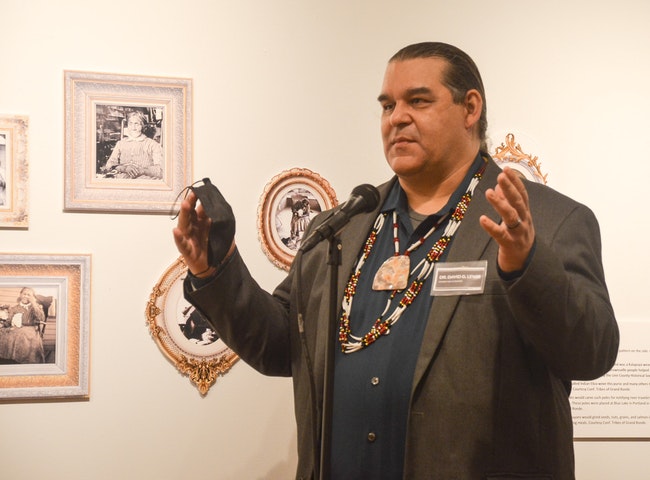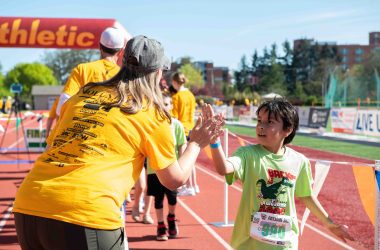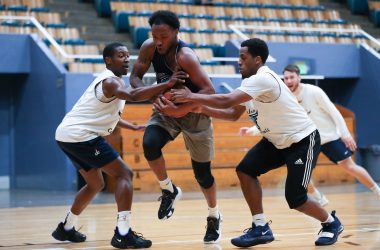Many historians of the past stopped detailing Indigenous history in Oregon once the Federal Government created reservations, and don’t explore the experience of the families enduring assimilation. Dr. David Lewis took to the archives to show why that perspective is sorely lacking.
A decade’s worth of research went into Lewis’ latest book, which details the largely unrecorded and under-researched Indigenous history of the Willamette Valley.
He’s spent a lot of time with old records, including transcribing previously-recorded oral histories from federal records and digitizing tens of thousands of pages of documents. Over the years, he’s written over 500 essays on the peoples of the Willamette Valley for his blog.
“I’ve discovered a lot of things in history that people haven’t seen before. Discovered histories that had never been written about before,” he said. “The depth of information out there, it just can be staggering.”
That work came together into his new book, “Tribal Histories of the Willamette Valley,” which was released on Nov. 14. Lewis will discuss the book at a lecture and signing open to the public on Monday, Nov. 20, at 4:30 p.m.
The event will be in Willamette University’s Alumni Lounge at 935 Mill St. S.E.
The book spans from the first years of the tribes’ contact with settlers through the assimilation efforts of boarding schools. It includes Salem history, and on his blog Lewis has described the creation of The Mills where the Willamette Heritage Center now sits, whose use as a mission school to assimilate Indigenous children is the subject of ongoing research and archaeology.
Lewis is a member of the Confederated Tribes of the Grand Ronde, and an expert in Indigenous history. As an assistant professor, he teaches full time at Oregon State University in Anthropology and Indigenous Studies.
Lewis said that he’s become adept in searching through archives, because the history of tribes in Oregon is not well recorded or researched by historians. He’s collected thousands of pages over the years, and digitized them onto his computer.
“A lot of it is largely not in current publication at all, or it’s never been published,” Lewis said. “And for whatever reason, historians in the past generally didn’t want to write detailed histories of tribal contexts,” and that Native history tends to end with the creation of reservations.
“So I’m saying, ‘well, when the tribes got to the reservation, history continued.’ My ancestors, my relatives experienced a lot of things, and here’s what they experienced,” he said.
Lewis said much of the book comes from repurposed and expanded blog essays, and that the book is written for a more general, rather than academic, audience.
“Anybody can pick it up or read it pretty well, and it could be used in high schools if they want to,” he said. “Hopefully people can easily read it, and I have my own personal perspectives in there too.”
He said his perspectives in the book are his coming to terms with 180 years of poor treatment by the federal government and Americans.
“I think people need to understand more about Native history. I think it’s been a problem in Oregon, and most of the states, of nobody really learning Native history unless they take a class in college,” he said. “ I think that people would be better off and more respectful of other people if they learn about Native histories, as well.”
Lewis will have another book talk at Chemeketa Community College on Jan. 24, 2024. The lecture will be at Chemeketa’s Multicultural Center, 4000 Lancaster Dr. N.E., from 1 p.m. to 3 p.m.
Update: This story was updated to include information about an additional lecture at Chemeketa Community College.
Contact reporter Abbey McDonald: [email protected] or 503-704-0355.
SUPPORT OUR WORK – We depend on subscribers for resources to report on Salem with care and depth, fairness and accuracy. Subscribe today to get our daily newsletters and more. Click I want to subscribe!
Abbey McDonald joined the Salem Reporter in 2022. She previously worked as the business reporter at The Astorian, where she covered labor issues, health care and social services. A University of Oregon grad, she has also reported for the Malheur Enterprise, The News-Review and Willamette Week.









